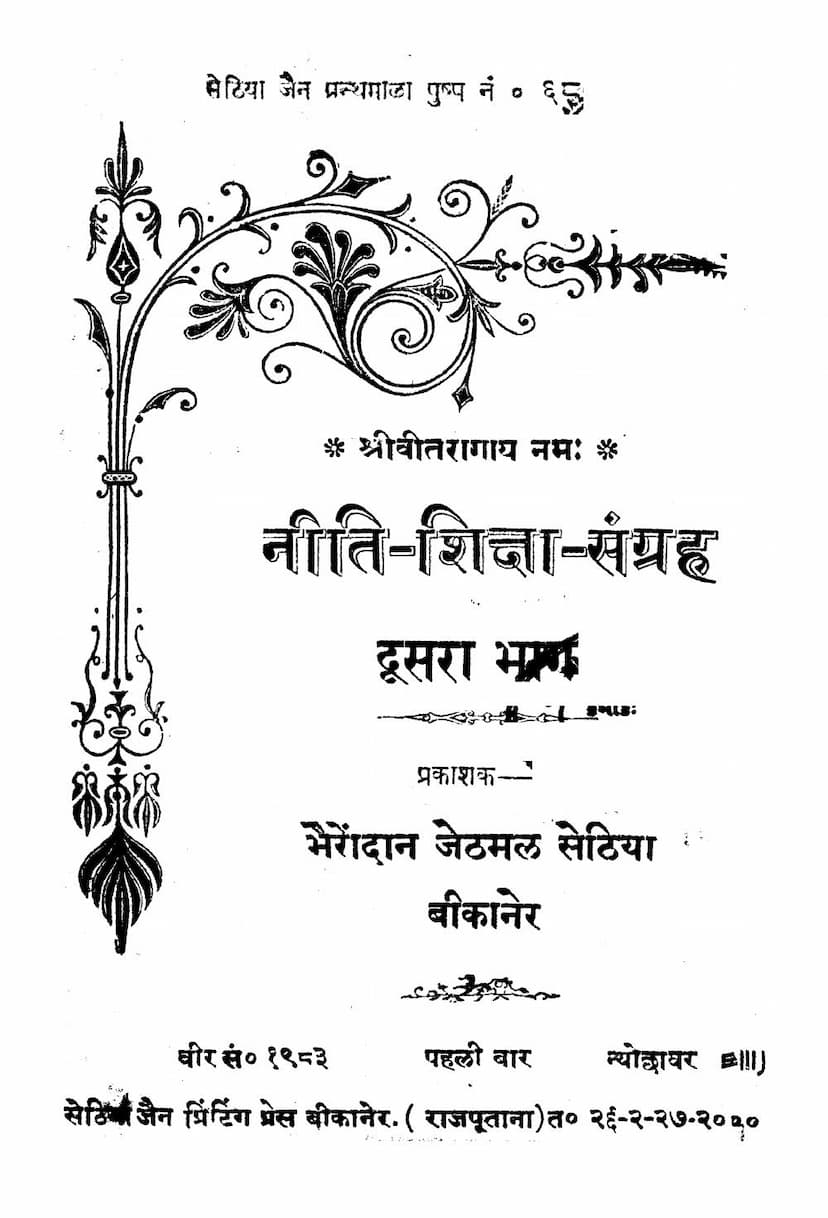Niti Shiksha Sangraha Part 02
Added to library: September 2, 2025

Summary
The provided text is the Hindi translation and transcription of "Niti Shiksha Sangraha Part 02" by Bherodan Jethmal Sethiya, published by Bherodan Jethmal Sethiya. This comprehensive Jain text, also known as the "Collection of Moral Teachings, Part 02," is a guide to righteous living and practical advice, covering a wide range of subjects essential for human well-being and spiritual development according to Jain principles.
The book is divided into several sections, each focusing on specific aspects of life:
1. Niti-shiksha ki Vishay-suchi (Table of Contents for Moral Education): This section outlines the vast array of topics covered in the book, including health preservation, education for students, household utilities, business, the duties of societal leaders, and general moral and spiritual teachings.
2. Swasthya Raksha Mani Mala (Jewel Garland of Health Preservation): This extensive section provides detailed guidance on maintaining good health. Key points include: * Daily Routine: Waking up before sunrise, remembering the divine, performing ablutions and daily rituals, and engaging in practical activities. * Dietary Advice: The benefits of milk and other dairy products, the importance of timely meals (early breakfast, midday lunch, early dinner before sunset), and the harmful effects of night eating. It emphasizes drinking water before meals to aid digestion and avoiding excessive water consumption. * Eating Habits: Eating at fixed times, not overeating, chewing food thoroughly, and consuming fresh, appetizing food. * Body Management: The concept of dividing the stomach into four parts (two for food, one for water, one for air) to avoid overeating. * Specific Remedies and Advice: Information on dealing with insect bites (scorpions, dogs), treating common ailments like fever, coughs, hiccoughs, and providing remedies for headaches, ear problems, and eye diseases. * Hygiene and Exercise: The importance of cleanliness, the benefits and types of exercise for both men and women, and precautions related to physical exertion. It also discusses the benefits of oil massage and the importance of protecting vital fluids (Veerya Raksha). * Food Safety: Methods for testing food for poison. * Health Rules: General rules for maintaining health, including sleep patterns and the benefits of oil massage.
3. Chhatradi Prasharan Shiksha Mani Mala (Jewel Garland of Conduct for Students and Others): This section focuses on conduct and behavior, particularly for students, but also for individuals in various roles: * For Students: Emphasis on waking early, praying, studying diligently, respecting elders (parents, teachers), being honest, speaking kindly and truthfully, avoiding conflict, and practicing sincerity. * For Professionals and Societal Roles: Guidelines for community leaders, merchants, farmers, lawyers, doctors, employees, and servants, outlining their duties, responsibilities, and ethical conduct. It stresses integrity, hard work, and serving society.
4. Grihasthopayogi Mani Mala (Jewel Garland for Household Use): This section offers practical advice for householders, including: * Business and Trade: Principles of ethical business practices, fair trade, understanding market demand, prudent financial management, and the importance of reputation. * General Morality: Teachings on true happiness, righteousness, serving the nation and community, and the importance of character. * Qualities of a Good Person: Describing the traits of a good citizen, a righteous individual, a nationalist, a qualified professional, and a virtuous person in all walks of life. * Qualities of Animals: Interestingly, it includes sections on the characteristics of horses and cows, likely for practical purposes or as analogies for understanding human behavior and qualities. * Policy and Ethics: General moral teachings and ethical principles to guide daily life.
5. Niti Mani Mala (Jewel Garland of Policy/Ethics): This section provides foundational ethical and philosophical insights: * The Importance of Ethics: Ethics are presented as the source of wealth, desire, and liberation, upholding societal order and welfare. * Karma and Destiny: The text emphasizes that actions (karma) shape one's destiny and experiences, with the soul being eternal and unaffected by material changes. * The Nature of Virtues and Vices: It discusses the importance of controlling senses, the dangers of greed, anger, attachment, and pride, and the virtues of forgiveness, kindness, and detachment. * The Five Great Vows (Pancha Mahavratas) of Jainism: Non-violence (Ahimsa), truthfulness (Satya), non-stealing (Asteya), celibacy/chastity (Brahmacharya), and non-possession/non-attachment (Aparigraha) are highlighted as crucial for spiritual progress. * The Goal of Life: The ultimate aim is described as liberation (Moksha) through self-realization and righteous conduct. * The Significance of Righteous Living: The book stresses that true happiness comes from living a virtuous life, serving others, and seeking spiritual knowledge. * Wisdom and Folly: Contrasting the characteristics of wise and foolish individuals, emphasizing the importance of introspection, continuous learning, and avoiding harmful habits.
The book is filled with practical advice, metaphors, and stories, often drawing parallels from nature or common life to illustrate moral principles. It advocates for a disciplined, ethical, and virtuous life, aiming to lead individuals towards personal well-being, societal harmony, and spiritual enlightenment, all within the framework of Jain philosophy. The text also includes specific medicinal advice and observations on health, reflecting a holistic approach to life.